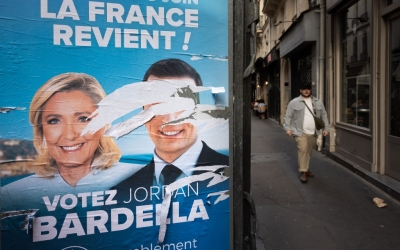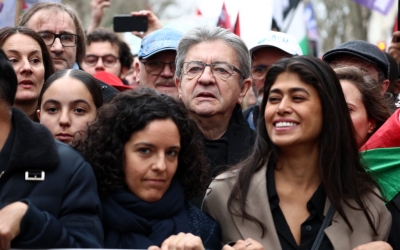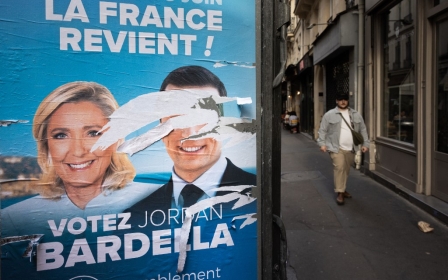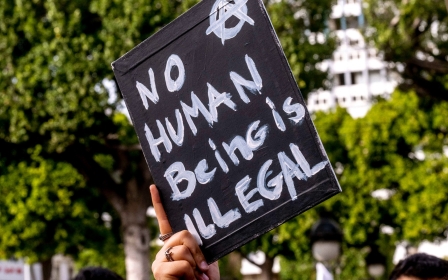French elections: The far right will have to show 'pragmatism' in North Africa if it wins
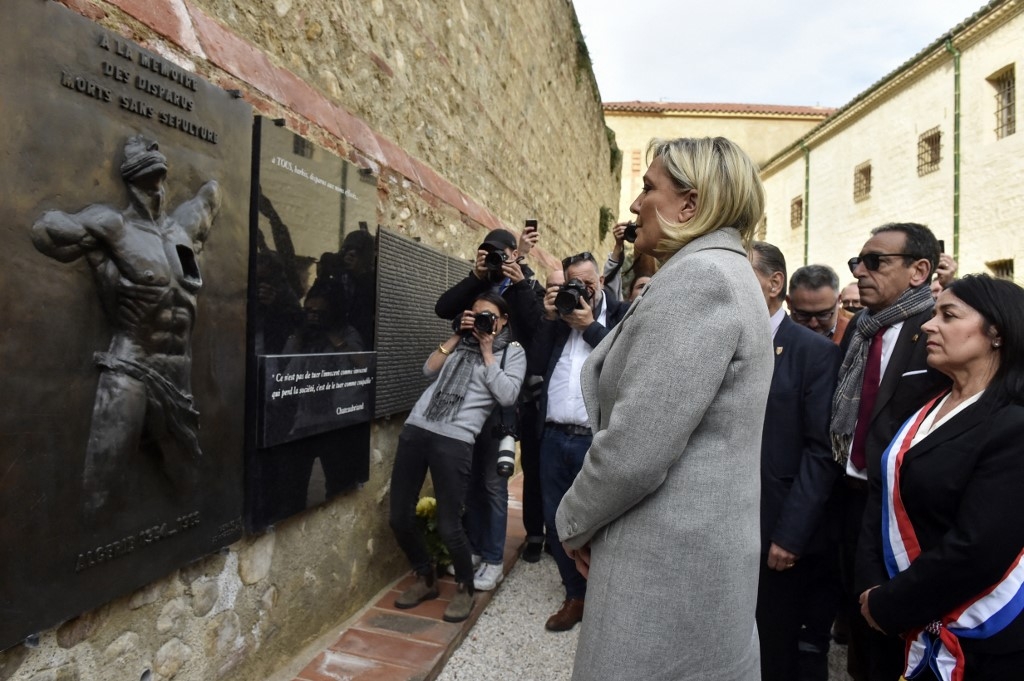
The prospect of a far-right government in France following the upcoming parliamentary elections has triggered many questions in North Africa, a region historically linked to the country by its colonial past.
The far-right party led by Marine Le Pen achieved a landslide victory on 9 June, securing 30 seats in the European parliament in Strasbourg.
That prompted President Emmanuel Macron to organise snap legislative elections at the end of the month that could see the populist, anti-immigration and anti-Islam party form a government led by 28-year-old leader Jordan Bardella.
Seen from Morocco, Algeria and Tunisia, the political turmoil in France is a source of concern.
What will happen to the efforts led by Macron to improve relations with Algeria, including a visit by President Abdelmadjid Tebboune to France scheduled for late September? What about the laborious work of “reconciliation of memories” made by historians from both countries?
New MEE newsletter: Jerusalem Dispatch
Sign up to get the latest insights and analysis on Israel-Palestine, alongside Turkey Unpacked and other MEE newsletters
Could Paris’ stance on Western Sahara, a cause of tensions between Morocco and Algeria, evolve in favour of Rabat?
And what about trade, security cooperation, or relations with the increasingly authoritarian rule of Tunisia’s President Kais Saied?
First on their list of uncertainties is the issue of migration, as France is home to the largest number of migrants from the Maghreb.
In 2022, 48.2 percent of immigrants living in France were born in Africa, and the most common countries of birth for immigrants in the country are Algeria (12.5 percent), Morocco (11.9 percent), Portugal (8.2 percent) and Tunisia (4.7 percent).
The day after its victory in the European elections, RN’s spokesperson Sebastien Chenu reiterated the determination of its party to repeal the December 1968 Franco-Algerian agreement on immigration, which it presents as "advantageous" for Algerians.
Designed to facilitate economic immigration and address labour shortages in France in the 1960s, the agreement provided for the free movement of Algerian nationals between the two countries. But over time, this right has gradually been challenged.
The implementation of a visa policy deprived Algerians, like other non-EU nationals, of the ability to travel to France by merely presenting their identity card, as stipulated in the 1968 agreement.
In fact, the renewable ten-year residence certificate, granted to Algerians under the treaty, is a privilege that is not always easy to obtain.
An ex-Algerian diplomat who spoke to Middle East Eye on the condition of anonymity, as he is bound by confidentiality, said: “This is a populist measure geared at the French national public opinion”.
“Algiers will take offence on principle, but in reality, this agreement is no longer compatible with the Algerian migratory reality in France," the former diplomat added.
For example, family reunification, made necessary by the emigration of workers in the 1960s, is no longer an issue nowadays.
‘The scenario of a border lockdown is more than plausible’
- Nordine Azzouz, Algerian journalist
The former diplomat also believes that a certain "pragmatism" may prevail between France and Algeria in case of a victory of Le Pen’s party.
According to him, the Algerian authorities have no interest in alienating the RN if they want visas for their nationals, while the RN has no interest in alienating the Algerians if the party wants to deport illegal migrants who have been issued an Obligation to Leave French Territory (OQTF).
However, Algerian journalist Nordine Azzouz expresses more concern.
"Migratory policies are the number one subject on which the far right has been building its narrative for years, even decades," he told MEE. "The scenario of a border lockdown is more than plausible."
The RN has announced a stricter visa policy with countries that do not cooperate in the field of migration, and this could translate into a fewer number of visas granted to Algerians.
"We should expect restricted access to residency visas in France, in addition to the current restrictions many applicants already face," Azzouz added.
'The RN would be wise to compromise'
In Morocco, political scientist Aziz Chahir believes that the far right "has no interest in antagonising [King] Mohammed VI, particularly through a hardening of migration policy or visa restrictions."
"Morocco presents itself as a crucial partner for Europe in the fight against illegal migration and terrorism,” he told MEE. “It would therefore be risky for the French far right to venture into reconsidering security cooperation with the kingdom.”
The same status quo could apply to Tunisia, an important partner of France and the European Union in the fight against illegal immigration. Last year, Paris gave Tunis 26 million euros “to contain the irregular flow of migrants in order to encourage their return in good conditions”.
This policy aimed at “outsourcing migration controls”, which has been alleged by migrant rights groups of prompting European countries to close their eyes to the authoritarian excesses of President Saied, means that “business as usual” may prevail in the case of an RN victory.
Tunisian political analyst Hatem Nafti draws a parallel with Italy’s far-right government.
"Marine Le Pen speaks almost the same language as [Italian prime minister] Giorgia Meloni," he told MEE.
For the past few years, the migration strategy employed by Meloni, who was elected in 2022 on a platform aimed at drastically reducing illegal immigration, “has been perfectly accepted by the [Tunisian] government," Nafti explained.
Regarding the sensitive issue of visas, “we will see what Tunisia will do, but we already know that the Tunisian government has not reacted to the scandals of Tunisians in detention centres in France,” he said, referring to the “disgraceful” living conditions in French immigration centres as documented by an independent administrative authority.
“I think we are heading towards [the same absence of reaction]," Nafti said.
The analyst believes that for President Kais Saied, the rise to power of the far right in France would actually be "good news" and in line with its own anti-immigration policy.
The Tunisian head of state has accused illegal immigrants from Sub-Saharan Africa of trying to “change the demographic structure of Tunisia”, and the country’s authorities have been involved in serious violations against Black African migrants, refugees and asylum seekers, according to rights organisations.
Besides, like Le Pen’s party, Saied has made political Islam his bete noire.
Since he unilaterally suspended the parliament and dissolved the government in what many have called a "constitutional coup" in 2021, Saied has led a crackdown on critics that Amnesty International has described as a "politically motivated witch hunt".
Ennahda, the main opposition party in Tunisia, has three senior leaders in prison, including former parliament speaker Rached Ghannouchi, who was arrested on 17 April 2023.
‘French far-right MPs were rather in support of the Tunisian regime, approving its arrests of Islamist leaders’
- Hatem Nafti, political analysist
"When the European Parliament adopted a resolution in March 2023 condemning the human rights situation in Tunisia, French far-right MPs were rather in support of the Tunisian regime, approving its arrests of Islamist leaders,” Nafti said.
Similarly, France’s economic interests would weigh in the attitude of an RN government towards its neighbours from across the Mediterranean.
If the far right is at the helm, trade with France could experience a slowdown in the three Maghreb countries.
"Algeria, like other North African countries, [is an] important [market] for French companies and exporters. Those countries could very well turn to other suppliers in an already well-established trend that has seen France no longer lead the exports to these countries," Azzouz explained.
"At the level of the European Union, which is linked to the Maghreb by association agreements, other countries will take advantage of the situation to offer their products," the journalist added.
This competition between Europeans, but also with Russia, America, Turkey, and China, could, according to political scientist Chahir, push a far-right government "to think twice before undertaking any action likely to threaten French economic interests and those of the Alawi regime [Morocco]."
In the end, "the RN would be wise to compromise with the established political regimes in the Maghreb region, starting with Morocco,” Chahir believes.
In Tunisia too, "the agreements will remain in line with the interests of the French and more generally the Europeans, all wrapped in a discourse of 'respect' for Tunisian sovereignty,” according to Nafti.
“Obviously, this is a big joke when one knows the National Rally’s attachment to the nostalgia of French Algeria and its glorification of the colonial period."
The risk of renewed tensions with Algeria
The National Front, the previous name of RN, was founded by Le Pen’s father, Jean-Marie, a former army officer accused of torturing Algerians during the war of independence.
According to Azzouz, this “DNA” of the French far-right party could derail the reconciliation process initiated by Macron and Tebboune to improve bilateral relations.
The RN has condemned this approach and opposed any gesture to “reconcile memories” between the two countries, the journalist explained.
"We run the risk of witnessing a brutal interruption of the process put in place on both sides to resolve the memorial dispute between Algiers and Paris," Azzouz said.
Another question that could further compromise the fragile bilateral relationship between Paris and Algiers is Westen Sahara and RN’s expressed support for Morocco’s stance on the issue of the disputed region.
Western Sahara, a former Spanish colony, is approximately 80 percent controlled by Morocco but claimed by the Sahrawi independence movement of the Polisario Front, which is supported by Algeria. Algiers broke off diplomatic relations with Rabat in 2021, mainly because of the issue.
Chahir explains that the RN has historical ties with the Alawi kingdom. In 1990, Jean-Marie Le Pen was granted an audience by King Hassan II with a delegation of other far-right MEPs.
“Like his father, King Mohammed VI has maintained 'secret' relations with far-right figures,” Chahir added, giving the example of political scientist Aymeric Chauprade, a former advisor to Marine Le Pen and a staunch defender of the Moroccan position on Western Sahara.
"Devoted to the idea of a French Algeria, Le Pen did not hesitate to express his support in 2007 for the proposed autonomy for Western Sahara within the framework of Moroccan sovereignty,” Chahir recalled.
According to Emmanuel Dupuy, president of the European Institute for Perspective and Security (IPSE), a think tank based in Paris, if Marine Le Pen comes to power, France's recognition of Morocco's sovereignty over Western Sahara will be "immediate".
In Algeria, where such an announcement would likely cause a diplomatic break, observers believe that France, even led by the far right, is not ready to take such a risk.
Middle East Eye delivers independent and unrivalled coverage and analysis of the Middle East, North Africa and beyond. To learn more about republishing this content and the associated fees, please fill out this form. More about MEE can be found here.


